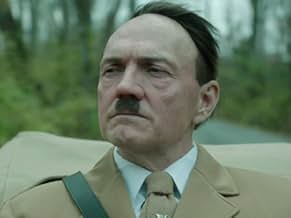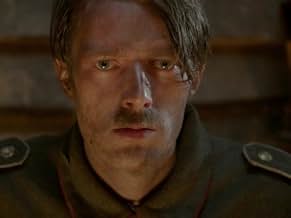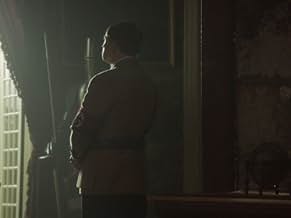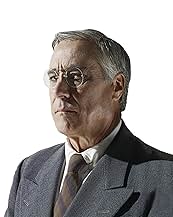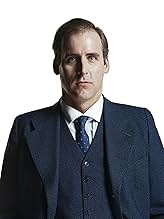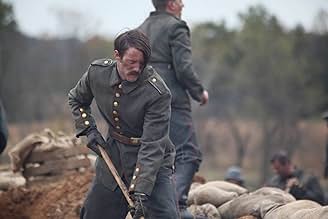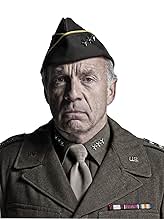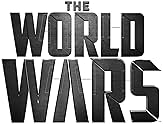The World Wars - Wie zwei Kriege die Welt veränderten
Originaltitel: The World Wars
IMDb-BEWERTUNG
7,9/10
2529
IHRE BEWERTUNG
Füge eine Handlung in deiner Sprache hinzuA look at both World Wars and what the biggest names in history did during each war and the time in between.A look at both World Wars and what the biggest names in history did during each war and the time in between.A look at both World Wars and what the biggest names in history did during each war and the time in between.
- Für 3 Primetime Emmys nominiert
- 1 Gewinn & 4 Nominierungen insgesamt
Folgen durchsuchen
Empfohlene Bewertungen
There are numerous inaccuracies in this re-creation. Two of the most glaring are the singling out of MacArthurs and Patton, while General Eisenhower and Admiral Nimitz aren't even mentioned. The war in the Pacific was primarily a Naval war, and that effort was led by Nimitz. Even MacArthur's retaking of the Philippines was only possible because the Navy and Marines cleared the way across the Pacific. General Eisenhower was the Supreme Allied Commander in Europe, and his contributions were the key to the victory in Europe. Patton was a superb battlefield commender, but lacked the judgment necessary for a position such as that held by Eisenhower. Patton is the kind of guy you want in the lead when you have to "go", but you never want him making the decision whether or not you should "go".
1) They compressed 30 years of history into 4 and a half hours. Things will get left out doing so.
2) This was never intended to be a doctorate-level course in European and American History.
3) It was entertainment! GOOD entertainment. Churchill's speech in Part II actually made me sit up a little straighter and sent chills down my spine.
4) Yes, there were equipment and armament inaccuracies. They also had a little thing called a BUDGET, keep that in mind that it wasn't an infinite one.
5) If you sat down to watch this with a checklist of every single event of World War I and II, you are missing the point. It painted the broad strokes very well. If it can get even ONE person interested in learning more about that era, then the producers did their job as far as I am concerned.
2) This was never intended to be a doctorate-level course in European and American History.
3) It was entertainment! GOOD entertainment. Churchill's speech in Part II actually made me sit up a little straighter and sent chills down my spine.
4) Yes, there were equipment and armament inaccuracies. They also had a little thing called a BUDGET, keep that in mind that it wasn't an infinite one.
5) If you sat down to watch this with a checklist of every single event of World War I and II, you are missing the point. It painted the broad strokes very well. If it can get even ONE person interested in learning more about that era, then the producers did their job as far as I am concerned.
Do not watch this series expecting a comprehensive study of both World Wars a la Ken Burns's Civil War. It's not. However, it presents a cause-and-effect survey of how connected the two wars were.
First the negative: This program focuses on a few key figures yet totally omits any mention whatsoever of Eisenhower. How do you cover D-day without at least mentioning the name Eisenhower? Eisenhower was the ONLY 5 star general, yet two others in this program erroneously wore 5 star insignia.
Positive: Jeremy Renner did a great job narrating. The series is educational and worth watching. Although it's imperfect, I learned a few things from this series. I like how it treats both World Wars as one conflict because it was. The Treaty of Versailles wasn't a peace treaty at all and set the stage for resumption of fighting.
This series will leave you hungering for more, in depth programs that once were offered by The History Channel before they chose to waste our time on such nonsense as Pawn Wars.
First the negative: This program focuses on a few key figures yet totally omits any mention whatsoever of Eisenhower. How do you cover D-day without at least mentioning the name Eisenhower? Eisenhower was the ONLY 5 star general, yet two others in this program erroneously wore 5 star insignia.
Positive: Jeremy Renner did a great job narrating. The series is educational and worth watching. Although it's imperfect, I learned a few things from this series. I like how it treats both World Wars as one conflict because it was. The Treaty of Versailles wasn't a peace treaty at all and set the stage for resumption of fighting.
This series will leave you hungering for more, in depth programs that once were offered by The History Channel before they chose to waste our time on such nonsense as Pawn Wars.
I've been enjoying the show, but you have to really know the true history and then make allowances for the "Cliff Notes version" (see http://www.cliffsnotes.com/) that this is. It's highlights and simplification.
Bear in mind that the "History" channel now includes a heavy dose of alien and UFO conspiracy theory, ghost hunting and religion bashing. Everything on History needs to be taken in the context of other sources or you will surely be mislead. I could fill a couple of pages with historical misstatements or omissions in this program, but it does add something to the overall story, so long as you don't take it as the single source! They portrayed the main German attack as coming through the Maginot line when in fact it was bypassed by attacking through the same Ardennes forest they later used in the Battle of the Bulge. Never mentioned was the 8th Army battle in North Africa, or the role of Field Marshall Erwin Rommel. No mention of the Battle of the Atlantic. Also ignored was the role that the Japanese war in China played in American - Japanese relations.
All in all, it is a good story which can be a good addition to the overall narrative, but you really need to already understand the entire context in order to not be mislead. Movies and mini-series can bring stories to life, but there is really no substitute to actually reading the many wonderful memoirs of the people who were actually there!
Having just watched it again, in addition to the omissions and over-simplifications, there are also glaring mis-statements of fact and factual error galore. It will suffice to point out just two: #1 they stated that Patton defeated Italy in six weeks, when he was actually NEVER involved in the Italian campaign which lasted nearly to the end of the war. He (and Field Marshall Montgomery) won the battle of Sicily. BTW How anyone can discuss Patton without discussing Montgomery as well is beyond anyone who knows the story. #2 they leave the impression that Patton was only called back to duty during the Battle of the Bulge, when in fact, it was Patton who led Operation Cobra, which created the breakout from the Normandy beachhead in August.
Bear in mind that the "History" channel now includes a heavy dose of alien and UFO conspiracy theory, ghost hunting and religion bashing. Everything on History needs to be taken in the context of other sources or you will surely be mislead. I could fill a couple of pages with historical misstatements or omissions in this program, but it does add something to the overall story, so long as you don't take it as the single source! They portrayed the main German attack as coming through the Maginot line when in fact it was bypassed by attacking through the same Ardennes forest they later used in the Battle of the Bulge. Never mentioned was the 8th Army battle in North Africa, or the role of Field Marshall Erwin Rommel. No mention of the Battle of the Atlantic. Also ignored was the role that the Japanese war in China played in American - Japanese relations.
All in all, it is a good story which can be a good addition to the overall narrative, but you really need to already understand the entire context in order to not be mislead. Movies and mini-series can bring stories to life, but there is really no substitute to actually reading the many wonderful memoirs of the people who were actually there!
Having just watched it again, in addition to the omissions and over-simplifications, there are also glaring mis-statements of fact and factual error galore. It will suffice to point out just two: #1 they stated that Patton defeated Italy in six weeks, when he was actually NEVER involved in the Italian campaign which lasted nearly to the end of the war. He (and Field Marshall Montgomery) won the battle of Sicily. BTW How anyone can discuss Patton without discussing Montgomery as well is beyond anyone who knows the story. #2 they leave the impression that Patton was only called back to duty during the Battle of the Bulge, when in fact, it was Patton who led Operation Cobra, which created the breakout from the Normandy beachhead in August.
This series can be commended for trying to tackle and combine WWI and WWII. Most historians agree that WWI directly led to WWII. However, this writers constant combining and oversimplification of important facts and events leads to inaccuracies and just straight falsehoods. If you are going to invest several hours watching World War 'history', your time would be much better spent watching "The World at War" series.
Wusstest du schon
- WissenswertesThe actor who plays General Douglas MacArthur (Daniel Michael Berkey) is the same actor from another History Channel production, The Men Who Built America. He plays JP Morgan's father, Junius.
- PatzerDuring the 1930s when Douglas MacArthur was army Chief of Staff he did not have five stars. That did not happen until December, 1944.
Top-Auswahl
Melde dich zum Bewerten an und greife auf die Watchlist für personalisierte Empfehlungen zu.
- How many seasons does The World Wars have?Powered by Alexa
Details
- Laufzeit
- 4 Std. 30 Min.(270 min)
- Farbe
- Sound-Mix
- Seitenverhältnis
- 1.78 : 1
Zu dieser Seite beitragen
Bearbeitung vorschlagen oder fehlenden Inhalt hinzufügen


